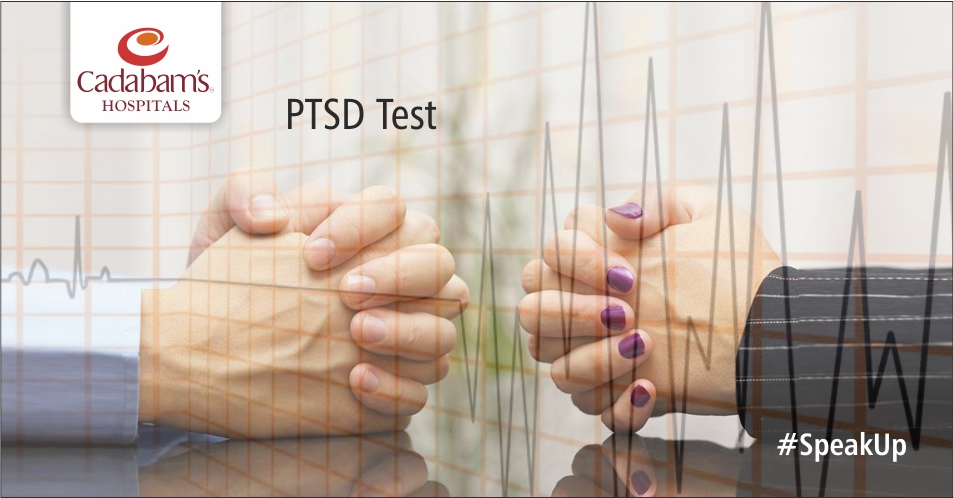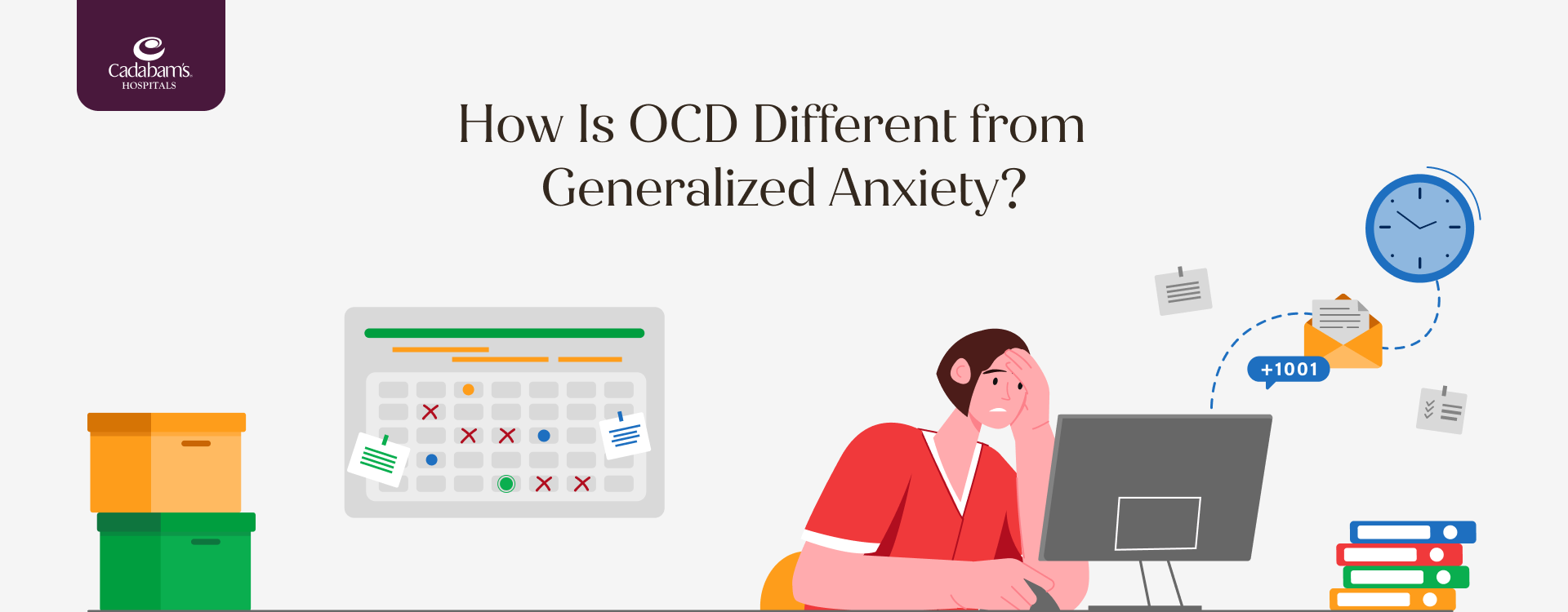Table of Content
Post Traumatic Stress Disorder is highly difficult to deal with and can negatively impact your daily life. Early diagnosis of the situation helps eliminate the problem before it digs its root deep and causes violent breakouts.
If you are having trouble getting over some traumatic or stressful incidents in your life, then it is recommended to take professional help. Cadabam’s Hospitals is a mental healthcare center that is reckoned for its holistic care for various psychological issues. There is a dedicated team that focuses on treating patients dealing with post-traumatic stress disorders. Once you reach out to the center, you will be required to take a PTSD test online.
Based on the answers that you give during the evaluation, the experts will suggest clinical diagnosis and later formulate a personalized treatment plan for you. The hospital has been treating patients for more than three decades and has built a strong clientele nationwide. If you are experiencing any symptoms associated with PTSD, then you should reach out to Cadabam’s Hospitals at 9741476476 or info@cadabamshospitals.com.
What Is Post Traumatic Stress Disorder (PTSD)?
Post Traumatic Stress Disorder (PTSD) is a mental disorder that an individual experiences after going through or witnessing of a traumatic event/s like military combat, terrorist incidents, natural disasters, physical or sexual assault in adult or childhood life, serious accidents, etc.
Survivors of traumatic event/s tend to carry a baggage of unpleasant effects post they get back to normalcy. These stress reactions can be so distressing that they end up affecting the individual’s work, personal and social areas of living. These reactions sometimes do not go away with time but may worsen over time. These symptoms end up causing the development of PTSD.
What Is Complex Post Traumatic Stress Disorder Test And How Does It Work?
A range of distressing experiences are encountered; to help you figure if you need to seek professional help, take the test below to understand if you suffer from PTSD or not. Following are some questions; if you seem to have scored maximum ‘yes,’ seeking treatment will help you alleviate the distress.
- Have you been exposed to or experienced or a traumatic event?
- In that traumatic event, did you experience intense helplessness, fear, and/or horror?
- Have you experienced intrusive images or thoughts about the traumatic event?
- Do you experience moments wherein you feel like you are re-living the event?
- Do you experience recurrent nightmares about the traumatic event?
- Do you experience any physiological and/or emotional distress when you remember the traumatic event, probably triggered when thought about or when you see something of the traumatic event?
- Does avoiding feelings, thoughts, or conversations concerning the traumatic event make you feel better?
- Does avoiding activities, places or people, concerning the traumatic event make you feel better?
- Do you find it hard to remember details about the traumatic event?
- Post the traumatic event, has your interest reduced in activities that you previously enjoyed?
- Post the traumatic event, do you find it difficult to trust people or connect with them?
- Post the traumatic event, do you find it difficult to regulate experience or show emotions?
- Are you negative about your future post the traumatic event?
- Post traumatic, do you experience sleep disturbances?
- Post the traumatic event, do you experience irritability or have an outburst of anger?
- Post the traumatic event, do you have issues with concentration?
- Post the traumatic event occurred, do you feel guilty because others died or were hurt during the event, but you survived?
- Post the traumatic event; are you startled or jumpy easily?
- Post the traumatic event, are you often hyper-vigilant?
- Has it been a month since you have experienced the above experiences?
- Do these symptoms interfere with your work, personal or social activities?
If you did score out on maximum ‘Yes,’ this is what should be your necessary steps to combat this distress:
- Fix an appointment to meet up with a clinical psychologist or a psychiatrist.
- Share your experience with a trusted friend or family member/s about your condition; this is extremely important as you do need all the support and understanding that you can get.
- Learn about PTSD and understand what you are experiencing.
- You are not alone; connect with other survivors.
Disclaimer –
If you are having trouble getting over some traumatic incident and it is affecting your day-to-day life, then you may be suffering from the post-traumatic stress disorder. This screening test is an easy and effective way to identify the same. However, you should not consider this as a substitute for clinical diagnosis. If you have scored high on the test, then you should immediately seek out professional help and get the treatment started.
Get Effective PTSD Care At Cabadamas Hospitals
A clinical diagnosis must be taken to precisely determine whether or not you are suffering from PTSD and what is your current mental status. To diagnose post-traumatic stress disorder, the doctors are likely to -
- Perform a thorough physical exam in order to identify the medical problems that may be triggering the symptoms.
- Perform a psychological evaluation, which encompasses a discussion of the symptoms you are experiencing and the event that caused the same.
Experts at Cadabama’s focus on providing you with personalized and holistic treatment for your condition. The hospital offers holistic treatment for PTSD that include –
- Cognitive Behavioural Therapy
- Exposure Therapy
- Eye movement desensitization and reprocessing
- Medications
- Family therapy
Why Cadabam’s
Cadabam’s Hospital in Bangalore has dealt with a great deal of mental health patients and have curated customised treatment plans based on their experiences. The state of the art facilities along with expert professionals will ensure that you get a proper diagnosis and treatment to aid you in your recovery.
Frequently Asked Questions
What are the core symptoms of post-traumatic stress disorder?
The symptoms of PTSD are categorized into four types that include negative alterations in mood and thinking, intrusive memories, changes in emotional and physical reactions, avoidance. These symptoms can vary from person to person and time as well.
What can cause PTSD?
Post-traumatic stress disorder can be developed when you see or learn about an event, including threatened or actual death, sexual violation, or severe injury. While doctors are not certain of the exact reason why people develop PTSD, but here some of the reasons that may contribute to this disorder –
- Inherited mental health risks like a family history of depression and anxiety.
- Stressful experiences including the severity and amount of trauma you have experienced in life.
- Inherit characteristics of your personality, known as temperament.
- The way the brain regulates hormones as well as chemicals in response to stress.
What are the stages of PTSD?
Following are the main stages of PTSD –
- Emergency or Impact Stage
It occurs right after the traumatic event. This is a stage where the individual is struggling to accept what has happened.
- Denial Stage
In this stage, the individual will experience strong feelings brought upon by the memory of the event, but they will try to avoid the emotions.
- Short-Term Recovery Stage
This stage attempts to provide immediate solutions to the problems. The individual will try to get back to normalcy.
- The Long- Term Recovery Stage
Individuals will continue to experience after-effects of the trauma. But with treatment, the symptoms can be reduced and, over time, completely overcome.
What Does a PTSD Attack Feel like?
An individual suffering from PTSD can experience physical sensations of panic attacks, including hot flashes, breathlessness, heart palpitations, etc.
How Cadabam's Help you for Addiction?
- 410+ Professional Consultants
- 1,00,00+ Happy Faces
- 120+ Currently Seeking Treatments










